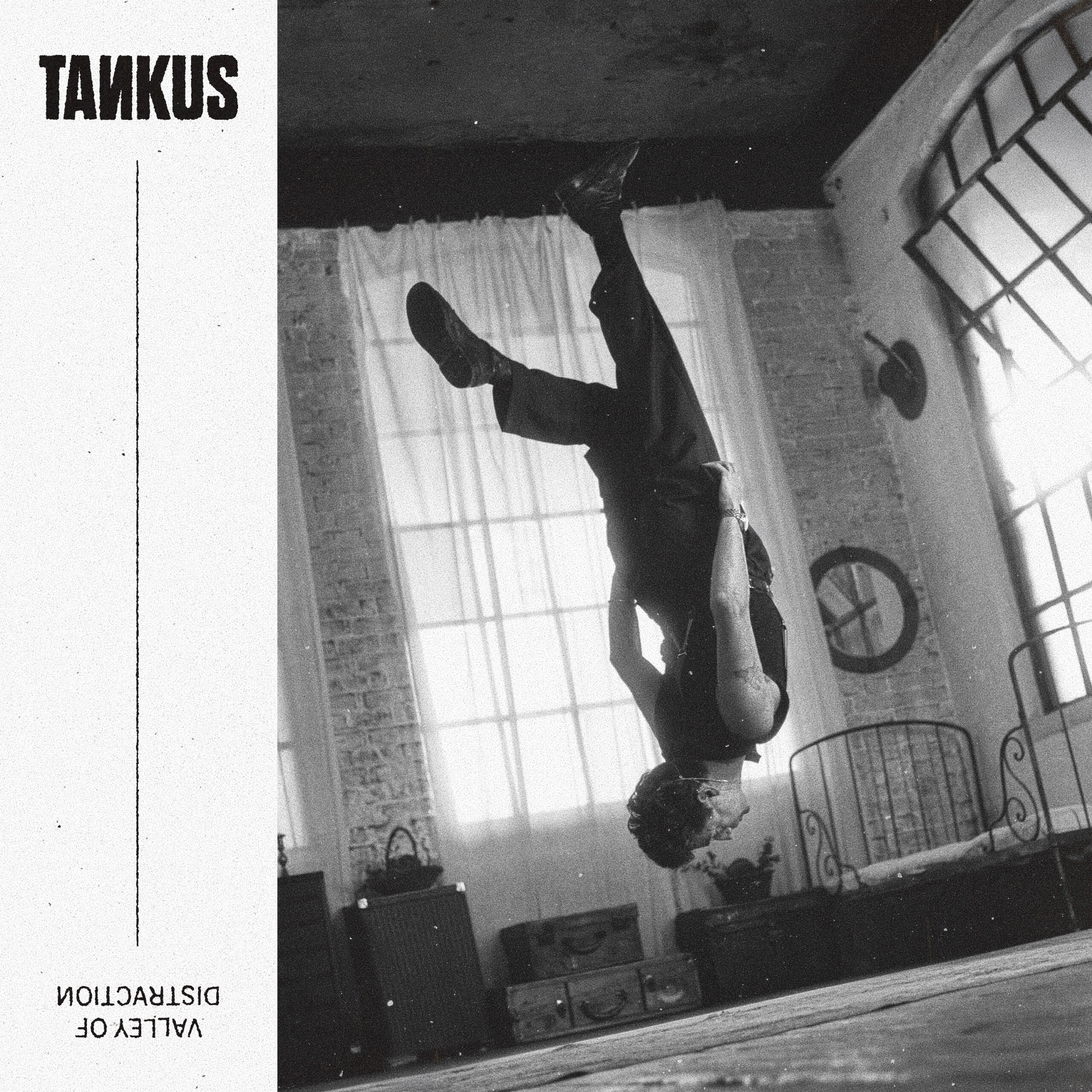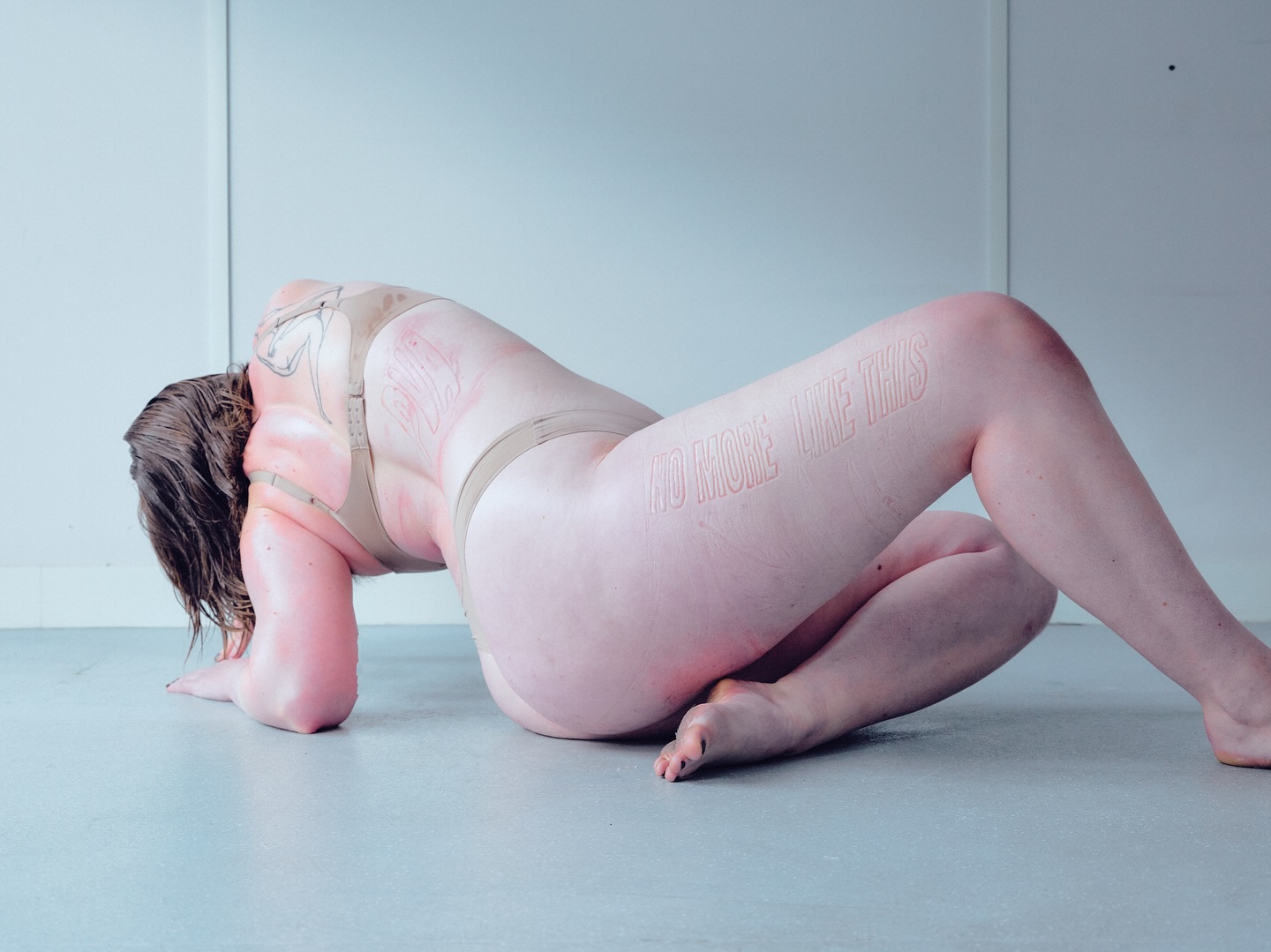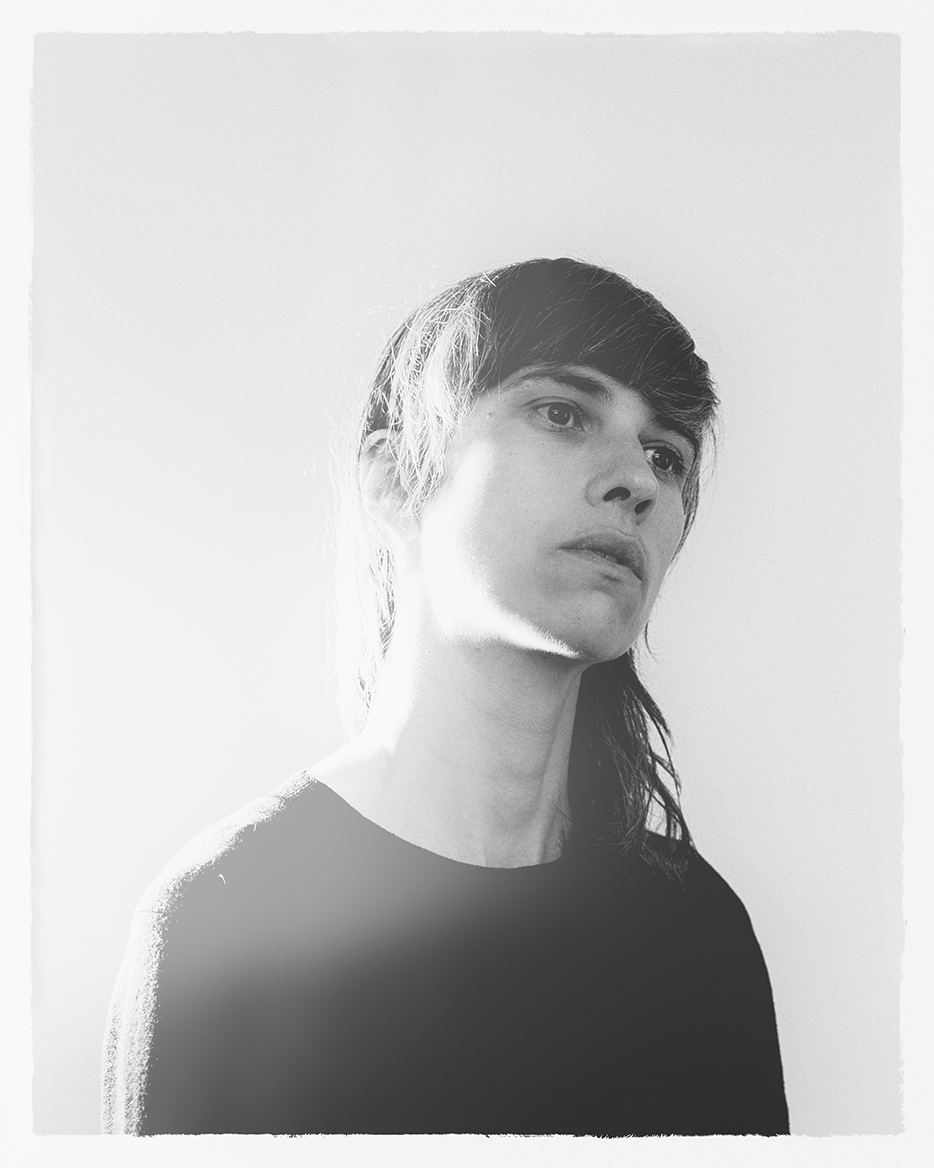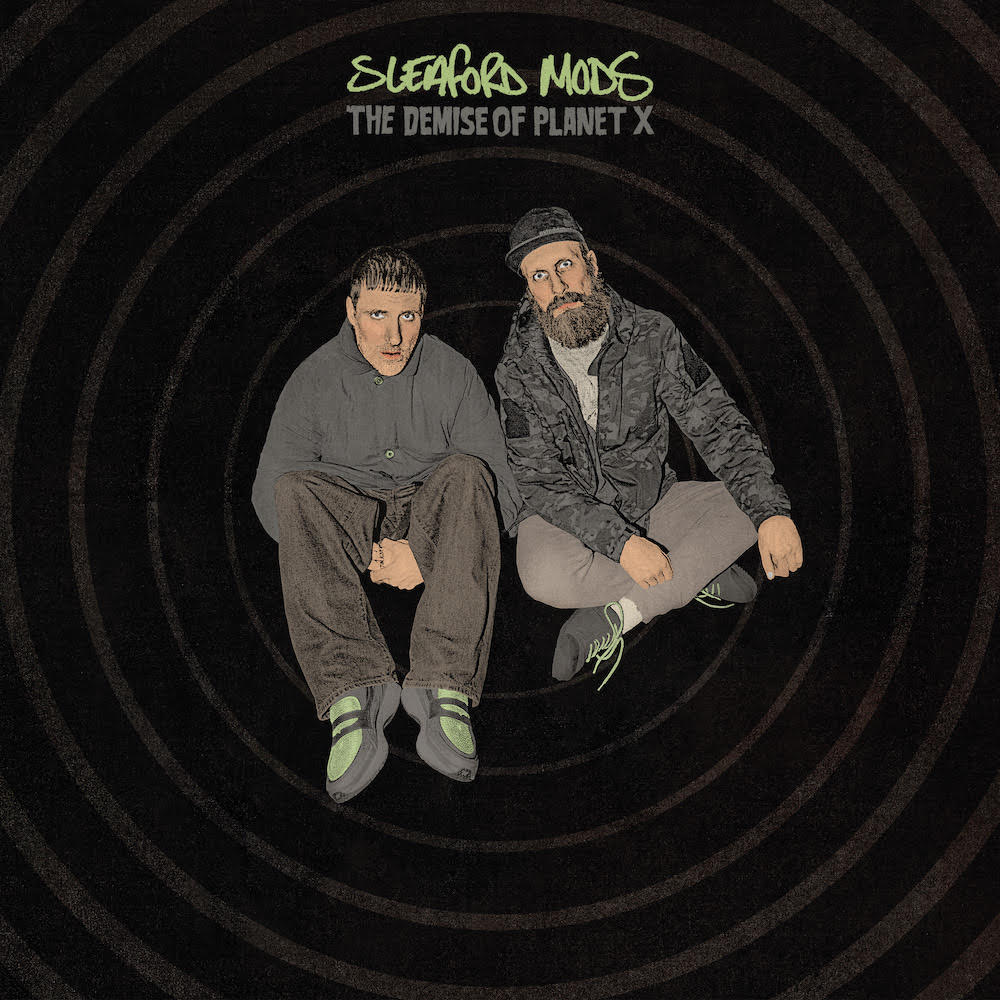Avec « Valley of Distraction », Tankus franchit une nouvelle étape dans son parcours artistique, quelque part entre l’énergie d’un cabaret fiévreux, la folie d’un rock’n’roll baroque et le storytelling urbain. Connu pour ses concerts incandescents, plus de 1 400 à ce jour, le groupe londonien a choisi ici un pari audacieux d’enregistrer un disque entièrement en live, en analogique, sans filet, dans le mythique Studio 5dB Records. Une décision rare à l’ère du numérique, motivée par une envie essentielle : retrouver le souffle collectif qui fait battre le cœur de Tankus sur scène. Un disque, produit par le légendaire Jim Sclavunos (Nick Cave & The Bad Seeds, Grinderman), profondément organique et instinctif, plein de poésie urbaine, de fulgurances rock’n’roll et de mélancolie lumineuse. Il incarne en 10 titres une sorte de voyage intense, rougeoyant, éperdument amoureux de rencontres, de routes, et d’une certaine idée de la liberté créative.
Au centre de cette aventure se tient Jaz Delorean, pianiste-écrivain-chanteur à l’allure de funambule romantique. Entre deux tournées éreintantes, il évoque avec nous la recherche de vérité sonore et l’importance vitale de jouer comme si chaque note était une prise de risque absolue. À l’heure où la musique devient souvent un produit marketing, Tankus revendique la beauté du chaos et l’union fragile d’un groupe qui respire cette chaleur humaine.
Valley of Distraction a été enregistré en live et en analogique, une approche rare aujourd’hui. En quoi cette méthode a-t-elle influencé ton jeu et ton expérience de la musique pendant l’enregistrement ?
C’est quelque chose que nous voulions essayer depuis longtemps, mais nous n’avions jamais vraiment eu le bon scénario ni la bonne équipe de production pour le faire correctement. Nous nous étions approchés de cela avec Luna Park! en 2020, mais nous cherchions aussi à créer une ambiance de fièvre, de rêve étrange. Cette fois, nous avions beaucoup tourné et nous voulions capturer l’énergie du son sur scène, mais avec le soin et l’attention du studio. Je ne suis pas vraiment un passionné de matériel, je n’enregistre pas chez moi : j’ai un piano acoustique et un magnétophone pour écrire. Les autres membres du groupe sont bien plus investis que moi dans le processus d’enregistrement. Moi, j’aime surtout créer le moment sur scène. Mais travailler comme nous l’avons fait pour « Valley of Distraction » a vraiment touché juste : j’avais l’impression de faire une performance. Tout a été enregistré dans le Studio A de 5dB Records (Londres), ce qui signifiait que nous pouvions tout faire ensemble, même la voix principale pendant que je jouais du piano. Nous avons ajouté des overdubs (superposition) de guitare, de chœurs et d’orgue, mais presque rien d’autre. Un morceau par jour pendant trois semaines, puis nous en avons choisi dix.
Tu dis rechercher la vérité plutôt que la perfection. Quelle “vérité” sonore ou émotionnelle as-tu trouvée avec cet album ?
Quand je dis ça, je veux simplement dire que je veux que les choses sonnent humain. Je veux que ça sonne comme un groupe de musiciens, jouant des chansons écrites par un humain avec des expériences émotionnelles et sauvages, enregistrées par d’autres humains, avec toutes les variables que cela implique. Dans un monde de plus en plus influencé par les ordinateurs et l’IA, je pense que c’est très important. Souvent, la prise avec la meilleure vibe comportera une voix qui se casse ou une mauvaise note quelque part, mais il ne s’agit pas de corriger ça : tout est dans l’ensemble.
Après plus de 1 400 concerts, comment parviens-tu à maintenir cette intensité et cette fraîcheur sur scène à chaque performance ?
Je ne compte pas vraiment, mais oui, ça fait beaucoup. Nous maintenons l’intensité parce que les chansons l’exigent, que le public l’attend, et que bien souvent nous avons passé des heures dans le van avant d’arriver sur scène. Si tu ne vas pas le faire correctement, alors fais autre chose, j’imagine.
Pour la fraîcheur… sauna quand c’est possible, Palomas au petit déjeuner, et manger des légumes au milieu du chaos.
Tu es maintenant signé chez 5dB Records, un label centré sur les artistes. En quoi ce partenariat a-t-il influencé ta liberté créative sur « Valley of Distraction » ?
Cela n’a pas vraiment influencé notre liberté créative. Nous avons fait les choses comme nous le faisons habituellement, avec le soutien d’un label qui comprend ce que nous cherchons à faire. C’est assez rare. C’est formidable d’avoir un espace, au siège du label, où nous pouvons traîner avec d’autres artistes, écrire, faire des démos et enregistrer au même endroit. Avant, nous faisions toujours ça sur la route, donc c’est un changement très positif.
La chanson « Clapton Pond » évoque la crise du logement et la disparition des espaces créatifs, un sujet très actuel. Quel est, selon toi, le rôle d’un groupe comme Tankus face à ces réalités sociales ?
Avec cette crise et toutes les autres crises actives dans nos vies, il est difficile de savoir quoi faire pour aider. Nous avons passé beaucoup de temps et d’énergie à être musiciens, et nous aimons rassembler les gens sur le dancefloor, les entendre chanter à l’unisson, et les voir repartir avec le sentiment d’avoir partagé un moment unique. Ce genre de chose est nécessaire aujourd’hui, dans une réalité néo-libérale désastreuse et échouée où l’argent circule en masse mais où nous connaissons le fossé de richesse le plus grand de tous les temps. Je ne suis pas expert en économie, j’aime juste faire danser les gens et, si possible, leur faire penser à ce qu’ils ont dans le cœur.
Dans « City of Angels », tu entremêles lieux, souvenirs et rencontres. Quelle ville ou quel voyage a le plus façonné ton identité musicale ?
« City of Angels » est une chanson d’amour avec des lieux précis de Los Angeles et de Londres. Ils sont importants pour moi, mais j’adore quand une chanson signifie quelque chose de personnel pour l’auditeur, comme un secret. Nous voyageons partout, il est donc impossible de désigner un endroit en particulier, mais jouer deux concerts à La Nouvelle-Orléans a été formateur. Tout comme passer du temps avec nos amis de la communauté itinérante du Lizard Stage, où des tonnes de groupes se retrouvent sous les étoiles pour jouer. C’est pour ça qu’on fait ce qu’on fait. Ce n’est pas vraiment l’endroit qui compte, mais ce que tu fais quand tu réalises que tu es vivant à cet endroit. Prends ton instrument et joue.
Après « Valley of Distraction », que représente la prochaine étape pour Tankus, artistiquement et personnellement ?
Eh bien, nous allons partir en tournée avec cet album pour les deux prochaines années, à travers plusieurs continents, dans des festivals, des clubs et tout un tas d’endroits. Nous sommes donc en train de trouver comment jouer tout ça en live. C’est la partie excitante pour moi. Regardez où nous nous arrêtons et venez dire bonjour. Artistiquement, c’est la même chose que personnellement. C’est tout le but. Merci pour les questions.
.
With « Valley of Distraction, » Tankus takes a new step in its artistic journey, somewhere between the energy of a feverish cabaret, the madness of baroque rock ‘n’ roll, and urban storytelling. Known for its incandescent concerts, more than 1,400 to date, the London band has taken a bold gamble by recording an album entirely live, in analog, without a safety net, in the legendary 5dB Records Studio. A rare decision in the digital age, driven by a fundamental desire: to recapture the collective energy that makes Tankus’s heart beat on stage. An organic and instinctive record, full of urban poetry, flashes of rock ‘n’ roll, and luminous melancholy. In 10 tracks, it embodies a kind of intense, glowing journey, passionately in love with encounters, roads, and a certain idea of creative freedom. At the heart of this adventure stands Jaz Delorean, a pianist-writer-singer with the air of a romantic tightrope walker. Between grueling tours, he discusses with us the search for sonic truth and the vital importance of playing as if each note were an absolute risk. At a time when music often becomes a marketing product, Tankus champions the beauty of chaos and the fragile unity of a band that exudes human warmth.
Valley of Distraction was recorded live and in analog, a rare approach these days. How did this method influence your playing and your experience of the music during the recording process?
It’s something that we wanted to try in the past, but we never really had the right scenario or production team to try it properly. We got some of the way with 2020’s “Luna Park!” but we were also attempting to make a more fever dream sound. This time, we had been touring really hard and we wanted to capture the vibe of the onstage sound with the care and attention of the recording studio. I am not particularly a gearhead, and I don’t spend time at home recording: I have an acoustic piano with a tape recorder to write. Other members of the band are way more into the recording process than me. I like to create the onstage moment really, but working the way we did on “Valley of Distraction” definitely hit the spot when it came down to feeling like we were doing a performance. Everything was recorded in Studio A at 5dB Records, and that meant we could do it all together, even the main vocal while I was playing piano. We overdubbed additional guitar, backing vocals and organ, but hardly anything else. One tune per day, for three weeks, and then we chose ten.
You say you seek truth rather than perfection. What, in your opinion, is the sonic or emotional “truth” you found with this album?
When I say that I just mean that I want things to sound human. I want it to sound like a group of musicians, playing songs written by a human with emotional and wild experiences, recorded by other humans, with all the variables that involves. In a world with more and more influenced by computers and AI, I think this is very important. Often the best take vibe-wise will have a voice crack or a wrong note in it somewhere, but it’s not about correcting those, it’s about the whole thing.
After more than 1,400 concerts, how do you manage to maintain this intensity and freshness on stage at every performance?
I’m not counting really, but it is a lot. We maintain the intensity because the songs require it and the audience expect it and we’ve often been sitting in the tour van for hours and hours before getting onstage. If you’re not going to do it properly, do something else I guess.
Freshness… sauna where possible, Palomas for breakfast, and eating vegetables among the chaos.
You are now signed to 5dB Records, an artist-focused label. How has this partnership influenced your creative freedom on Valley of Distraction?
It hasn’t really influenced our creative freedom at all. We have gone about our business the way we do, with the support of a label that understands what we’re getting at. It’s pretty rare. It’s great to have the space at the label HQ where we can hang out with other artists, write, demo and record all in the same place. We’ve always done that on the road before, so it’s a positive shift.
Clapton Pond addresses the housing crisis and the disappearance of creative spaces, a very topical subject. What, in your opinion, is the role of a band like Tankus in the face of these social realities?
I think that with this crisis and other active crises in our lives, it’s hard to know what to do to help. We’ve spent a lot of time and energy being musicians, and we love to bring people together on the dancefloor, to hear them singing as one, and leaving feeling like they’ve all shared a unique moment together. That kind of thing is needed right now in a disastrous failed neo-liberalism reality where there’s loads of money flying around and we have the biggest wealth divide of all time. I’m no expert on economics, I just like to make people dance and think about what’s inside their hearts, if possible.
In City of Angels, you intertwine places, memories, and encounters. Which city or trip has most shaped your musical identity?
City of Angels is a love song with distinct places in Los Angeles and London mentioned. They’re relevant to me, but I love it when songs mean something to the listener in a private way, like a secret. We travel all over, and it’s impossible to pin down a particular place, but playing two shows in New Orleans was formative. Just as hanging out with our friends in the travelling Lizard Stage community, where loads of bands hang out under the stars and play. This is why we do the thing we do. It’s not really about where you are, it’s about what you do when you realise you’re alive in that place. Pick up your instrument and play.
After Valley of Distraction, what does the “next step” for Tankus represent for you, artistically and personally?
Well, we’re going to take it on tour for the next two years, across continents, playing festivals and clubs and all manner of places, so we’re just working out how to do a lot of it live. This is the exciting part to me. Find out where we’re stopping and come say hi. Artistically IS personally. That’s the whole point. Thanks for the questions.




